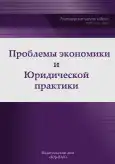Присвоенная стоимость актива и инвестиционный налоговый вычет: проблемы учета отложенных налогов
- Авторы: Аксентьев А.А.1
-
Учреждения:
- Кубанский государственный университет
- Выпуск: Том 19, № 5 (2023)
- Страницы: 270-282
- Раздел: Региональная и отраслевая экономика
- URL: https://journal-vniispk.ru/2541-8025/article/view/252637
- DOI: https://doi.org/10.33693/2541-8025-2023-19-5-270-282
- EDN: https://elibrary.ru/OHGISJ
- ID: 252637
Цитировать
Аннотация
В работе рассматриваются методические и теоретические аспекты бухгалтерского учета инвестиционного налогового вычета и присвоенной стоимости актива с позиции правил и норм международных стандартов и национальных стандартов США (US GAAP). Поднимается проблема несовершенства IAS 12 «Income Taxes» в части учета отложенных налогов при первоначальном признании актива. Раскрываются особенности оценки по справедливой стоимости, когда в амортизируемую величину актива включаются налоговые эффекты. Обосновывается расчет присвоенной стоимости актива и отложенного налога, а также их учет на бухгалтерских счетах. Устанавливаются методические направления учета инвестиционного налогового вычета в зависимости от влияния налоговой льготы на налоговую базу актива. Делается вывод о наличии противоречий и несогласованности в существующих методиках учета инвестиционных налоговых льгот, а также выражается авторская позиция по поводу их в квалификации в составе бухгалтерских активов. Результаты работы в первую очередь предназначены научному и профессиональному сообществу в целях их обсуждения и продолжения исследований в области учета инвестиционных налоговых льгот. В качестве перспективных направлений в рамках данной темы можно выделить проведение сравнительного анализа российского инвестиционного налогового вычета с американским инвестиционным налоговым кредитом; и методических подходов учета последнего в США в 1960-ые гг.
Полный текст
Открыть статью на сайте журналаОб авторах
Андрей Андреевич Аксентьев
Кубанский государственный университет
Автор, ответственный за переписку.
Email: anacondaz7@rambler.ru
ORCID iD: 0000-0002-0838-4729
SPIN-код: 9601-6154
ResearcherId: AAT-9852-2021
магистрант
Россия, КраснодарСписок литературы
- Аксентьев А. А. Сущность и классификация отложенных налогов // Вестник Пермского университета. Серия: Экономика. 2021. Т. 16. № 4. С. 421–448. doi: 10.17072/1994-9960-2021-4-421-448
- Арзаева В. К. Инвестиционный вычет по налогу на прибыль: региональные аспекты применения // Экономика. Бизнес. Финансы. 2019. № 12. С. 22–27.
- Бондарева Н. А. Особенности применения инвестиционных налоговых вычетов // Учет. Анализ. Аудит. 2020. Т.7. № 2. С. 48–55. doi: 10.26794/2408-9303-2020-7-2-48-55
- Бородин О. А. Эволюция концепции справедливой стоимости // Международный бухгалтерский учет. 2011. № 23 (173). С. 28–33.
- Сальникова К. В. Способы оптимизации налога на прибыль с использованием инвестиционного налогового вычета // Universum: экономика и юриспруденция. 2021. № 5 (80). С. 13–17. doi: 10.32743/UniLaw.2021.80.5.13-17
- Туякова З. С. Справедливая стоимость в системе рыночной оценки объектов бухгалтерского учета // Вестник Оренбургского государственного университета. 2006. № 9 (59). С. 199–205.
- Черкашина Т. А. О проблемных аспектах внедрения инвестиционного налогового вычета по налогу на прибыль организаций // Теоретические и практические аспекты трансформации налоговой системы России: материалы Всероссийской научно-практической конференции (Ростов-на-Дону, 18 декабря 2019 г.). Ростов-на-Дону: изд-во Ростовский государственный экономический университет «РИНХ». С. 99–105. URL: https://elibrary.ru/item.asp?id=43775245 (дата обращения: 19.09.2022)
- Черноусова К. С., Глотова А. В., Кривов Н. А. Инвестиционный налоговый вычет в системе налогообложения Российской Федерации // Вестник науки и образования. 2021. № 6-1 (109). С. 34–37. doi: 10.24411/2312-8089-2021-10602
- Ястребова Е. Н. Налоговый и бухгалтерский учет инвестиционного вычета по налогу на прибыль // Актуальные вопросы теории и практики бухгалтерского учета и финансов: Материалы II научно-практической конференции (Тверь, 28–29 апреля 2020 г.). Тверь: изд-во Тверской государственный технический университет. С. 43–48. URL: https://elibrary.ru/item.asp?id=44228838 (дата обращения: 19.09.2022).
- Acheampong D., Valencia A., Volkan A. Industry specific impact of simplifying deferred taxes // Journal of Finance and Accountancy. 2013. Vol. 13. URL: https://www.aabri.com/manuscripts/131485.pdf (дата обращения: 19.09.2022).
- Ayres F.L. An Empirical Assessment of the Effects of the Investment Tax Credit Legislation on Returns to Equity Securities // Journal of Accounting and Public Policy. 1987. Vol. 6. pp. 115–137.
- Berg K.B., Mueller F.J. Accounting for Investment Credits // The Accounting Review. —1963. —Vol. 38. —No. 3. —pp. 554–561.
- Breitkreuz R. Grundfragen zur Steuerabgrenzung in der internationalen Rechnungslegung—Eine konzeptionelle und bilanztheoretische Analyse auch vor dem Hintergrund empirischer Befunde. Doctoral dissertation Nr. 4001. Universität St. Gallen, 2012. 350 p. URL: https://www.econbiz.de/Record/grundfragen-steuerabgrenzung-internationalen-rechnungslegung-konzeptionelle-bilanztheoretische-analyse-hintergrund-empirischer-befunde-breitkreuz/10009656326 (accessed 19.09.2022).
- Brouwer A., Naarding E. Making deferred taxes relevant // Accounting in Europe. 2018. Vol. 15. No. 2. P. 200–230. doi: 10.1080/17449480.2018.1451903.
- Chambers R.J. Tax Allocation and Financial Reporting // ABACUS. 1968. Vol. 4. № 2. pp. 99–123. doi: 10.1111/j.1467-6281.1968.tb00412.x.
- Chludek A. K. On the Relation of Deferred Taxes and Tax Cash Flow // SSRN. Working Paper. 2011. doi: 10.2139/ssrn.1778265.
- Colley R., Rue J., Volkan A. Deferred Taxes Revisited // Journal of Business & Economics Research.—2004. Vol. 2. No. 8. P. 13–24. doi: 10.19030/jber.v2i8.2907.
- Cramer Jr. J.J., Schrader W.J. The investment tax credit: Conflict and accounting error // Business Horizons. 1970. Vol.13. № 1. pp. 85-89
- Hürlimann D., Teitler-Feinberg E. Aktivierung von verlustvorträgen unter or aktivierungspflicht oder aktivierungsverbot? // EXPERT FOCUS. 2019. Vol. 9. pp. 546–550. URL: https://unternehmerforum.ch/wp-content/uploads/2019/08/Aktivierung_von_Verlustvortraegen_unter_OR_Huerlimann_Teitler.pdf (accessed 19.09.2022).
- Keller T.F. The Investment Tax Credit and the Annual Tax Charge // The Accounting Review.—1965. Vol. 40. No. 1 pp. 184–189.
- Morrison T.A., Buzby S.L. Effect of the Investment Tax Credit on the Capitalize-Expense Decision // The Accounting Review. 1968. Vol. 43. No. 3. pp. 517–521.
- Wade H.H. Accounting for the Investment Credit // The Accounting Review. 1963. Vol. 38. No. 4. pp. 714–718.
- Woolsey S.M. Accounting for «Investment Credit» // The Accounting Review. 1963. Vol. 38. No. 4. pp. 709–713.
Дополнительные файлы











